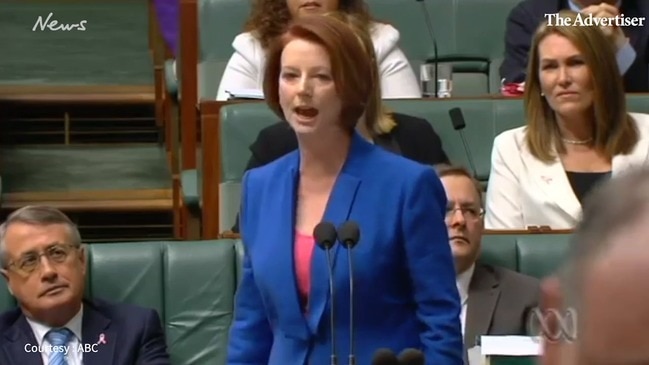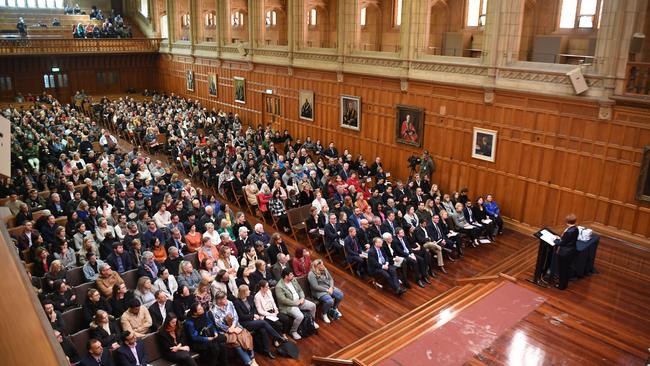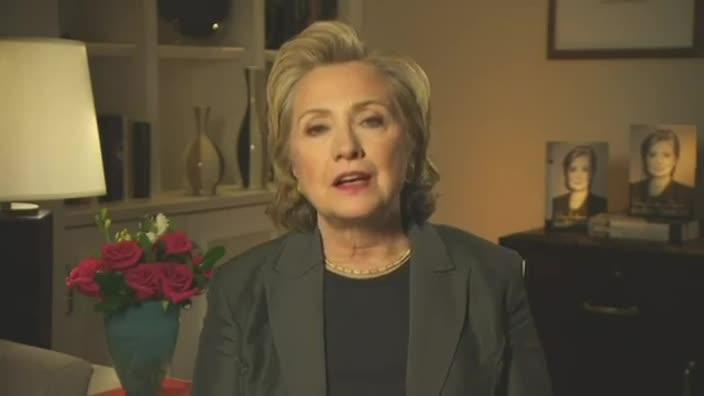No one expects an off-the-cuff speech delivered in anger across the political chamber to define their term in office.
In her three years as Australia’s first female Prime Minister, Julia Gillard introduced the royal commission into institutional responses to sexual abuse which gave a much-needed voice to silent victims. She ran a highly efficient parliament with a success rate in passing legislation better than any previous Prime Minister, including Bob Hawke.
And there was the hard-won five-year plan to increase environmental flows into the Murray-Darling river system.
Then there was the misogyny speech, an impromptu, unexpected 15 minutes of her life. Six years after leaving politics and this is what defines her public contribution, not just here but overseas.
It has taken a while for Gillard to make her peace with that but she has come to accept it, finally, as a good thing.
“For a while I was a little bit resentful about that, a bit wistful,” Gillard says in a rare interview in Adelaide, where she now lives. “I was in politics for a decade and a half, I was deputy prime minister, I was prime minister and we passed more legislation than other governments and brought in nation-changing reforms. And there is a sense in me that it all comes down to one short speech. Really?”

COMING SUNDAY: Ceiling Smashers — Celebrating extraordinary SA women
Well it was a good one. Her words were fiery and unplanned, and she named and shamed the gender-based attacks that had coloured the way she was being treated, particularly by Liberal leader Tony Abbott, and by some sections of the media.
Look back seven or eight years and it is astonishing how bad it was. Abbott appeared to see nothing wrong with being photographed in front of protest signs saying “Ditch the Witch” and, on one occasion, “Bob Brown’s Bitch”. Inflammatory radio host Alan Jones, after the death of Gillard’s father, said that John Gillard had died of shame over the lies his daughter told. (He had previously said she should be put in a chaff bag and dumped at sea.)
Then there was the stylish, empty fruit bowl in a photo shoot which somehow tarred her as a woman without children. Even feminist trailblazer and academic Germaine Greer took the low road with a cheap shot on the ABC’s Q&A program advising Gillard to get rid of the A-line jacket suits she favoured: “You’ve got a big arse, Julia. Just get on with it.”
Gillard had been playing it cool. She was the first woman to lead the country and she was braced for some level of gender backlash. Her plan was to ignore the insults and wait until the intense focus on gender blew over so she could get down to business. Only it never did.
“I was taken aback by how much commentary around my prime ministership was around gender, and I had assumed, you know, in the early months, it will get normal,” she says, sitting in a park in the Adelaide foothills near Brownhill Creek, close to where she grew up.
“But what I actually found was the longer I was Prime Minister — and obviously governments get into harder and harder political waters — the more gendered the environment became.”
Sexist insults became the first-line response from some political opponents and Gillard was shocked by their nastiness. She was politically tough. Although she grew up in a household where she and her sister were encouraged to go to university and become what they wanted, she was aware that being a female in politics made her vulnerable.
She left Adelaide’s Unley High to study law and arts at the University of Adelaide before graduating in Melbourne where she found her feet in the rough and tumble of student politics. She became an industrial lawyer at Slater and Gordon, a firm with an aggressive history in class actions and worker representation, and left in 1996 to join the office of Victorian Labor leader, John Brumby, as his chief of staff.
By the time she was Prime Minister, she had been in federal politics for more than a decade, she had served as a calm and articulate deputy to Kevin Rudd before seizing power from him in a bloodless coup. She was used to the brutal cut and thrust.
“I wasn’t naive, I knew that there would be a lot of focus on my appearance,” she says. “I knew there would be a lot of focus on the fact that I wasn’t married, I hadn’t had children. I expected all of that to be there. But some of the nastier stuff really did take me by surprise.”
On the day of the misogyny speech, she wasn’t planning to talk and there was no hint of the mark she was about to make. She was prepping for question time, with her Government bracing for a barrage of criticisms over the conduct of independent member Peter Slipper, Labor’s appointed Speaker, who had sent texts of a sexual nature to a former staffer. She took the precaution of pulling together some of Abbott’s most sexist quotes in case she needed to refer to them in the course of defending Labor in relation to Slipper. Instead of questions, Abbott moved that speeches be given, and he gave his first, saying the Government should die of shame. Gillard then followed.
“So what is now the misogyny speech is something that I put together from my handwritten notes while he was speaking,” she says. “It was completely impromptu. I think it shows that it was a speech that was in the moment and it shows in the delivery.”
She named and shamed the way she was being treated and what she said struck a chord.
“I will not be lectured about sexism and misogyny by this man,” she says, pointing angrily straight at Abbott, “ I will not! And the Government will not be lectured about sexism and misogyny by this man. Not now, not ever.” It was cool anger, controlled, but pure fire in the moment. Abbott smirked but looked uncomfortable as the attack went on.
The YouTube version has had more than three million views and Gillard continues to meet women who tell her they have watched it hundreds of times, and that they reach for it when they are feeling overwhelmed at work or at home. To these women, she is a heroine. The commanding tone in which she denounced her sexist treatment was transferable to so many different places and circumstances, and her words stood for women who did not have a national platform. She was angry for herself but she spoke for the many.
She may not have liked it at first, and her political ending was messy as the party dumped her for Rudd and then lost the 2013 election, but Gillard emerged from the political fire as a feminist warrior. She was the fiery martyr, the first woman prime minister who had to endure the worst of the backlash against her gender, and the one who stood up and said: “Enough!”

Since leaving politics in 2013, Gillard has set the gold standard for post-political dignified conduct. She hasn’t sniped, she hasn’t made sly digs and she has not been briefing against her successors. There was her political memoir, My Story, but it was widely regarded as not setting out to settle scores. She has moved on, in 2017 becoming chair of the national mental health advocacy body Beyond Blue, and by taking up a significant global role as a campaigner for female education.
“When I left politics I had to have a big think about what I wanted to do next,” Gillard says.
“Education was at the heart of what the government that I led did but post-politics I thought, ‘What can I do now that can still make a difference to education?’.”
Her focus was international and she chairs the Global Partnership for Education whose aim is to provide access to quality education for the world’s poorest children. With a budget of $3.7 billion it can seriously make a difference to the lives of children in the 68 countries in which it operates.
In a deliciously unconventional pairing, it has brought Gillard up close and personal with the singer Rihanna, who she met three years ago in a Soho restaurant to talk about their shared interest in education.
Rihanna, an entertainer who was discovered at 14, dropped out of school to become the chameleon superstar that she is. But she was aware she had not finished her education and wanted others in her family, including her brothers, to complete theirs.
She and Gillard talked about what being an ambassador would involve, and how there were currently 260 million children in the world today who don’t go to school.
Rihanna agreed to use her star power to change that. They have travelled to Africa together, as campaigners and friends, and in classroom visits Gillard sits back and watches the power of celebrity drive home the message of education.
“She is a very lovely young woman, very passionate about the cause, very natural when she meets people, very engaged,” Gillard says.
“I’ve got to be with her at schools where she has sung with the kids, and obviously they are open mouthed with delight at getting to meet her, let alone sing a song with her. That has made a big impression on me.”
thank you @JuliaGillard! Proud to stand for education with you! @GPforEducation @GlblCtzn @ClaraLionelFdn, let's get to work!
— Rihanna (@rihanna) September 24, 2016
On International Women’s Day this year, not long before the birth of Archie Mountbatten-Windsor, Gillard was on a panel hosted by the Queen’s Commonwealth Trust encouraging young women to become leaders, sitting to the left of the very pregnant Duchess of Sussex, Meghan Markle, and not far from Scottish singer Annie Lennox. The panel talked in turn about the importance of women speaking up.
“If things are wrong, and there is a lack of justice, and inequality, then someone needs to say something … and why not me?” the Duchess said.
Asked how the Duchess was faring as a magnet for gender-based criticism and Gillard says the pressures are inevitable.
“Oh, I think every woman who is publicly exposed, whether as a member of the royal family, whether as a singing legend like Rihanna, whether you’re in politics or in business — any woman who steps into the public square, I think has a particular set of pressures on her shoulders,” she says.
For three months of each year, Gillard is immersed in the glorious academic traditions of King’s College London, in the Virginia Woolf building to be exact.
The building, named after the Bloomsbury set writer and novelist who studied there from 1897 until 1902, is the natural setting for Gillard to record her series of interviews with prominent women in the series, named in honour of Woolf, A Podcast of One’s Own.
Gillard had put to King’s College the idea of a Global Institute for Women’s Leadership that would focus on the best evidence for attracting women into leadership.
She likes being on the other side of the questions.
“When we look around the world today, politics, business, society, the law, the kind of best statistic we ever get to is somewhere less than 30 per cent are women leaders,” she says. “We are doing some incredible research. I am trying to popularise it and make more waves of change to bring more women leaders through.”
Her interviews so far have included UK-based Australian humorist and writer, Kathy Lette, UK journalist and activist Caroline Criado-Perez, British financier Helena Morrissey and former Deputy Labor leader Tanya Plibersek who opened up about the conflict she felt in not standing for the top job. The series is open ended and there are more to come.
After losing the leadership in 2013, Gillard returned to Adelaide to spend time with her mother before she died.
Her sister, Alison, lives in Adelaide and Gillard enjoys being part of a warm family circle that includes niece Jenna and husband Damien, and their children, and nephew Tom and his wife Laura.
“I do feel like I am making up for lost family time, and I did have decades, literally, of lost family time,” she says. “And I am enjoying the nature of the lifestyle here.”
The truth is, she is gone more often than not. She and her partner Tim Mathieson own a block of land in country Victoria and they have a number of different bases where they spend time together with their dog Reuben.
She is often away, she has a media adviser and an office to help manage her busy life, and she gives regular talks where she can command a rapturous audience of up to 2000 who greet her as a feminist Joan of Arc.
One of her campaigns is to give greater everyday recognition to South Australia’s history as a pioneer of women’s rights and the first state to give women the right to vote. She thinks South Australia should be celebrating that history every day and has suggested a major public monument and meeting place to recognise how progressive the state was.
“I think that sense that we were leading the world back then gives us more energy to try and keep leading the world right now,” she says. “It would be a place to gather and reflect on what we should be doing next.”
She looks and seems fulfilled and happy. The toll of being the first woman prime minister must have been heavy but she has let it go, lessons learned, without rancour or bitterness. She was on hand at the May federal election to give informal advice, and to commiserate when Labor saw their chance of a Bill Shorten victory melting away, but has no formal role in the Party.
She can see change for women progressing, but slowly, and in some parts of the world getting worse. In Australia, at least, it is better than it was and one of the reasons she says that is, is because we are talking about her experience now.
“The fashionable view when I was prime minister was that gender didn’t explain anything about my prime ministership, and to the extent that I ever said that it did, people in the media would say, ‘That’s ridiculous, why on Earth is she talking about gender?,” she says.

“All these years later in Australia there is a lively conversation about gender and politics. I am a big believer in that if you don’t ever talk about things you never solve them. So I am pleased about that.”
Her only regret is that she did not speak out sooner, and louder, and with more support, against the baying chorus of sexism that seemed to dog her every move.
By not talking about it, and hoping it would quietly go away, she allowed it to flourish unchallenged. That is not to say she could have given the misogyny speech any earlier because it erupted as a conflagration of anger and events, coming from the cold hope of having tried until then to ignore the ugliness that was going on.
“I don’t think I could replicate that moment,” she says. “It was a product of the circumstances of the day and how I was feeling in that moment,” she says. “With the benefit of hindsight, I do think that earlier in my prime ministership, even in the earliest days, I should have spoken up about the debate that we needed to have about sexism in politics.”
What would also have helped was for other people to have stood next to her and spoken up for her. Why didn’t anyone else say something? Where were the supportive friends, male and female, in politics or business or public life, who were willing to take a stand on her behalf? It would have validated her experience and spread the burden that Gillard bore stoically on her own.
“I think it almost would have had more power if people outside of the political realm, business people, other commentators, had said, ‘Look, hang on, this is not exactly how we should be treating our first female Prime Minister’,” she says. “‘Let’s talk through how much of this is sexist and gender’.”
COMING SUNDAY: Ceiling Smashers — Celebrating extraordinary SA women

Add your comment to this story
To join the conversation, please log in. Don't have an account? Register
Join the conversation, you are commenting as Logout